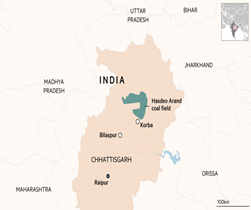Recreation of ‘Chipko movement’ to save Hasdeo Aranya
- Posted By
10Pointer
- Categories
Environment
- Published
28th Apr, 2022
-
Context
Local women in Surajpur district of Chhattisgarh started a tree-hugging campaign, as they were being cut for the mining project in Hasdeo Aranya.
Hasdeo forest
- The Hasdeo forest covering Chhattisgarh’s Korba, Sarguja and Surajpur districts, spans an area of 170,000 hectares.
- The forests are home to over 350 species of animals.
- It is a noted migratory corridor and has a significant presence of elephants.
- It is also the catchment area of the Hasdeo river, the largest tributary of the Mahanadi.
- It is one of the most extensive unfragmented forests in the Central Indian landscape.

- The area was declared as a ‘No-Go Zone’ for mining by the Centre in 2009.
- Despite this, mining in the region continued as the policy for the ‘No-Go Zone’ was not finalised.
- Much of Hasdeo Arand is a Schedule Fivearea. Additionally there are laws like the Panchayats (Extension to Scheduled Areas) Act and the Forest Rights Act, which devolve power to village assemblies and uphold their land and forest rights.
|
Korba and Hasdeo Arand are coal-rich regions in Chhattisgarh.

|
Important facts about the project
- Location: Surjapur district
- The Chhattisgarh government gave the final clearance to the second phase of the Parsa East Kete Basen coal mines.
- Both projects are owned by Rajasthan Rajya Vidyut Utpadan Nigam and operated by the Adani Group.
- More than 200,000 trees (clearance report shows 95,000 trees) will have to be axed for the mining in the Parsa coal block to begin.
- This project, spread over 1,200 hectares.
- It will lead to a displacement of around 700 people from Fatehpur, Hariharpur and Saili villages of the Sarguja and Surajpur districts.
Chipko movement
- The Chipko movement was a non-violent agitation in 1973 that was aimed at protection and conservation of trees.
- The uprising against the felling of trees and maintaining the ecological balance originated in Uttar Pradesh’s Chamoli district (now Uttarakhand) in 1973.
- In no time spilled onto other states in north India.
|
